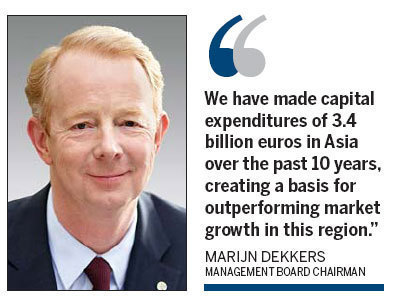Bayer to sharpen Asia focus with investment
Updated: 2011-11-17 10:22
By Wang Ying (China Daily)
|
|||||||||
SHANGHAI - Bayer AG plans to increase its presence in Asia and its revenue in the region to more than 11 billion euros ($14.88 billion) by 2015 by expanding production capacity, distribution network and research activities, a top executive said on Wednesday.
 |
"We aim to achieve a more than 60 percent increase in our sales in Asia by 2015. We want all of our subgroups in China to continue their rapid growth," Management Board Chairman Marijn Dekkers said in Shanghai on Wednesday.
The German-based pharmaceutical and chemical company's revenue in the Chinese market grew by 30 percent year-on-year to 2.9 billion euros in 2010. It intends to increase that figure to 6 billion euros by 2015, with its material science business accounting for about 3 billion euros, healthcare sector for 2.5 billion and crop science for 300 million, Dekkers said.
In the first nine months of 2011, Bayer's sales in China totaled 2.2 billion euros, 8 percent of its global sales.
If the company achieves its goal for Asia, its annual global sales would exceed 11 billion euros by 2015.
Over the past two decades, Bayer's business in Asia has grown significantly, Dekkers said. Twenty years ago, the region accounted only for about 10 percent of the global sales, equal to slightly more than 2 billion euros. By 2001, it was about 15 percent, and by 2010, its 2.9 billion euros in sales in China accounted for 20 percent of its global sales.
"We have made capital expenditures of 3.4 billion euros in Asia over the past 10 years, creating a basis for outperforming market growth in this region," Dekkers said.
As Bayer's biggest market in Asia and third-biggest worldwide, China remains strategically important for the pharmaceutical giant.
Over the past decade, the Chinese economy has grown by more than 9 percent annually - and is on track to do so in 2011 - despite the global financial downturn in 2008 and ongoing economic difficulties.
"As a result, China's economy last year became the world's second-largest. And we have no doubt that economic expansion in this country will continue at a similar pace in the coming years. For the period 2011 through 2015, the International Monetary Fund predicts an average annual growth rate of nearly 8 percent," Dekkers said.
The eurozone debt crisis has forced many multinational companies to rethink their strategies, with emerging economies such as China becoming their focal point for growth, Zhang Youwen, director of the Institute of World Economy at the Shanghai Academy of Social Sciences, was quoted as saying by the Jiefang Daily this month.
Also on Wednesday, a new production facility for Toluene diisocyanate (TDI) -used in the production of flexible foams - was officially opened at the Bayer Integrated Site Shanghai.
The TDI production facility, with a planned capacity of 250,000 tons a year, is based on a technology that reduces solvent use by about 80 percent compared with conventional plants of a similar size. It lowers energy consumption by up to 60 percent. The technology is significantly less expensive to use and reduces carbon dioxide emissions by 60,000 tons a year. In addition, it cuts the investment costs for large-scale plants of this type by around 20 percent.
Currently, each of Bayer's three subgroups - Bayer CropScience, Bayer HealthCare and Bayer MaterialScience - has a presence in China.











